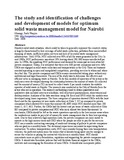| dc.description.abstract | Nairobi's solid waste situation, which could be taken to generally represent the country's status, is largely characterized by low coverage of solid waste collection, pollution from uncontrolled dumping of waste, inefficient public services and lack of key solid waste management infrastructure. Until 1970s, NCC collected over 90% of all the waste generated in the City. In mid 1980s, NCC performance was about 20% leaving about 290, 000 tonnes uncollected per year.
In 1990s, the appalling NCC performance and demand for municipal services attracted private companies. Today, it is estimated that there over 100 private companies and over fifty CBOs are engaged in solid waste collection and transportation in the City. These are business oriented operating in open and unregulated competition, providing services to whom and where they feel like. The private companies and CBOs remain uncontrolled taking place without any institutional and legal framework.
The aim of the study was to determine the effective and efficient actor in managing waste in Nairobi. To do this, models of operation of the actors in the study area were developed showing the relationship between the amount of waste (0) collected and the amount of money (TC) incurred to collect waste 0 per month evaluate the suitable operator of solid waste in Nairobi. The research was conducted in the City of Nairobi from the actors who are in operation. The research methodology used to obtain quantitative and qualitative data included interview schedules, well structured questionnaires, observations and desktop studies. Analysis of the data was done using Ms Excel and SPSS while the models were developed using linear regression.
The three categories of operators showed CBOs with the least fixed cost for the operation (at zero waste collection) at Kshs 7, 355 as compared to private companies which showed five times this amount (40, 609) while NCC showed more than 200 times (1, 617, 462). Further, the CBOs had the lowest cost per
tonne of waste collected at Kshs. 865 compared to private companies and NCC who incur almost two times this amount.
In conclusion, CBOs should be left as the waste operators especially in the low income areas where the residents are unable to pay a lot of money for waste management due to their low operating costs. Due to their relatively high operation costs, the private companies are more suited to operate in the high income areas and CBD where the people are able to pay for the services.
NCC may consider contracting sweeping of roads and cleaning of gulleys to private companies who are paid on a monthly basis. The divisional supervisors may assist in supervising these contractors. To reduce transportation costs, NCC may consider buying their own transportation vehicles, the preferred option since the money that is already being spent may be enough to secure the vehicles or paying the contracted vehicles on a monthly basis.
NCC should concentrate more on policy formulation, regulation and supporting the private companies and CBOs. It should also formulate policies that will facilitate financial support to the CBOs, motivate and encouraging the formation of more CBOs. It should also incorporate public education and awareness for sustainability of methods that can be used to reduce on the waste that gets to the disposal sites | en_US |

